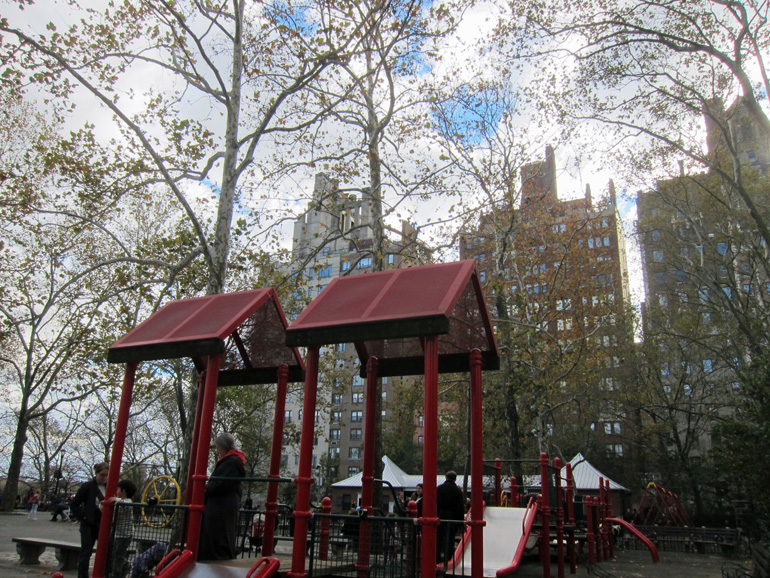Gotham Diary:
Good Habits
14 January 2013
Monday, January 14th, 2013
Blame it on the Sixties, but when I learned that Aristotle considered virtue a habit, I was disgusted. To the extent that habits were unconscious, they seemed a kind of death. The automation of behavior was a step toward body snatching. To be here now surely meant to be open to all the possibilities at any given moment, to consider every case afresh. Habits chewed up life before experience could be savored. By all means, blame it on the Sixties (and the Seventies), a period in which old habits were being outgrown and discarded everywhere you looked. Everything from dress to diet to sexual outlook was subject to change.
Now, of course, we know that the constant exercise of will power is physically exhausting, resulting in poor decisions. On a perfect day, will power is never called upon. It’s this freedom from hard choices that keeps the experience of life rich and fresh. On an ordinary day, good habits mean that you can find your keys and your wallet without tearing the house apart. There is a fresh box of dishwasher detergent in the closet. You do not get calls from bill collectors. Friends thank you for remembering their birthdays. If you have the habit of taking good care of yourself, then you can count on having enough energy to keep all the other habits going.
What I didn’t understand, although Aristotle was certainly trying to tell me, is that the best habit is a kind of knowledge. It is the distallate of observation and judgment, powerfully available in the moment of action. The better the observation, the more informed the judgment will be. I like to think of the habit of paying attention as a kind of acrobatic skill: how many connections can you run from whatever it is that you’re looking at to the different parts of your mind? (This is the very opposite of multitasking, which requires paying as little attention as possible — a dreadful idea.) How much can you take away from any given moment? You can take more, if you can rely on good habits to get you to the next one. Observation and judgment and habit — they begin to look like the same atom, seen in different phases.
***
The interesting question of “bad habits.” There are vicious practices — going out of your way to step on ants on the sidewalk, for example — that are merely untrammeled impulses. There are default behaviors — paths of least resistance too passive to merit the label of “habit.” All habits could be improved — more about why in a moment — but some clearly deserve to be called “poor.” (Multitasking, for example.) But a poor habit is probably better than no habit at all. As for addiction, it is involuntary, and “habitual” only in the vernacular.
The taxonomy isn’t important. Everything just mentioned puts a burden on will power. Vice and addiction overwhelm will power altogether. Poor habits, and the lack of habits, create a confusion that it’s difficult for the will to sort out.
***
Habits can always be improved for the same reason that I’m thinking about them: not only do we all need lots of (good) habits just to get things done, but we also need habits to resolve the conflicts that arise between different kinds of habits. I have the habit of writing an entry at this site every day. It is generally paramount; other things will have to wait until I’ve scribbled a few paragraphs. Every now and then, however, the priority is inconvenient or impossible. I might — as I did today — have doctor’s appointment. And that appointment will almost certainly elicit my habit of running as many errands as I can on any outing. So I did not just go to the dermatologist today. I went to the bank, the fancy dry cleaner, the video rental place on my way to the doctor, and, on my way home, after lunch, I shopped for dinner, had my shoes shined, and made separate stops to buy wine, a whisk, and bath soap. Then I came home. Then I sat down here.
Meanwhile, there is a terrible post-holiday messiness everywhere but in the bedroom. I would have better habits about giving large parties if I gave them more often, but that’s not going to happen, and in the year the passes between our routs, I am going to forget lots of little pointers. I’ve tried writing them down. The problem with that is that I do nort have the habit of beginning party preparation by reviewing notes from previous events (which, if not copious, would be useful). Instead, I have the vice of pretending that giving a bit party is “no big deal.” Disaster is averted because I do have a lot of habits about aspects of entertaining — lots and lots — and these more or less guarantee that there will plenty of everything and that no one will be poisoned. Nevertheless, I don’t have effective habits as a host. I can’t decide — which is to say that my poor planning saddles me with the decision — whether to spend time talking with my guests or to run about refreshing the refreshments. This year, all I could think of was how great it would be to carry Will around to meet my friends. And that was pretty great. Meanwhile, I completely forgot to serve the orzo salad. I’ve got tons of orzo salad in the fridge, not to mention mint-condition paper plates and bowls. And silvered plastic forks.
A few years ago, Kathleen and I hosted an important family party. Knowing my weaknesses as a host, and my great fondness for conversation, I hired Ray Soleil to run the back of the house. The party was a great success, and I enjoyed it as much as anybody. And that is where we are going to pick up this discussion: where the “servant problem” creates the need for good habits.








